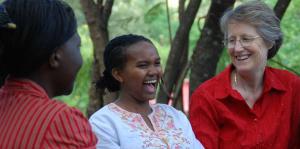I Will Sacrifice Myself For Peace!
 Three Peace Circle workshops took place 20-26 May, 2010 at St Mary’s Pastoral Centre, Nakuru. 35 women, mainly from the Rift Valley province, benefited from the training. Amongst other issues, most of the women had great concerns about the massive negative ethnicity in the country. The longing to forgive and to be forgiven was expressed, many having tears on their faces. The hunger and craving for real and genuine peace was very evident. The challenge of creating that peace from within was on the surface.....facing each of us. The sessions were filled with brainstorming in small group discussions. The heart of the workshops was definitely the personal story sharing sessions and the moments of silence, reflection and introspection.
Three Peace Circle workshops took place 20-26 May, 2010 at St Mary’s Pastoral Centre, Nakuru. 35 women, mainly from the Rift Valley province, benefited from the training. Amongst other issues, most of the women had great concerns about the massive negative ethnicity in the country. The longing to forgive and to be forgiven was expressed, many having tears on their faces. The hunger and craving for real and genuine peace was very evident. The challenge of creating that peace from within was on the surface.....facing each of us. The sessions were filled with brainstorming in small group discussions. The heart of the workshops was definitely the personal story sharing sessions and the moments of silence, reflection and introspection.
 To be peace creators it is important to really understand what peace really means. ‘Peace is a process, it needs time and sacrifice.’ ‘Peace is a life process that we need in our day to day lives.’ ‘I used to talk about peace with my mouth without real meaning but now I know what it means’ were some of the echoes.
To be peace creators it is important to really understand what peace really means. ‘Peace is a process, it needs time and sacrifice.’ ‘Peace is a life process that we need in our day to day lives.’ ‘I used to talk about peace with my mouth without real meaning but now I know what it means’ were some of the echoes.
Many of the women came with the notion that peace should start somewhere else; the neighbour, politicians, government, the so called bad guys... but soon this perception changed. ‘Peace must start from within.’ ‘I have realised that to create peace I must have peace within.’ ‘I have learnt to be peaceful myself before reaching out to others.’
 And what is needed to create peace? As one of the ladies said, there is a lot of work to do in order to achieve the goal of being peace ambassadors. ‘I need to sacrifice so much and I feel I have to change myself totally. I have to accommodate others so that I can create room for peace’ , shared a middle aged lady. ‘I will have to surrender some things in my life. I also need to learn to be a good listener’ , said another one. ‘I need to be honest and confident with myself and others’ expressed a young lady.
And what is needed to create peace? As one of the ladies said, there is a lot of work to do in order to achieve the goal of being peace ambassadors. ‘I need to sacrifice so much and I feel I have to change myself totally. I have to accommodate others so that I can create room for peace’ , shared a middle aged lady. ‘I will have to surrender some things in my life. I also need to learn to be a good listener’ , said another one. ‘I need to be honest and confident with myself and others’ expressed a young lady.
 The women tended to deeply accept and agree that peace is not a cheap thing. It calls for a lot of courage, commitment and inner strength. If you don’t have these virtues, then how do you forgive parents, relatives, friends or foes that have hurt you so much? The need for forgiving and being forgiven was deeply and sincerely expressed. One young lady who had gone through quite a lot after being rejected by her mother for some little mistake she made when she was a teenager, felt the need to forgive her mother. ‘I will go and make peace with my mum, I have forgiven her.’ And for some it was experiencing how real forgiveness feels. ‘In my life I have never experienced real forgiveness or apology. I have learnt these two very important virtues.’ For some it was learning the process of forgiveness. ‘The way I have been addressing the issue of forgiveness is not how I will be doing it now. I will change my attitude’ put across one lady.
The women tended to deeply accept and agree that peace is not a cheap thing. It calls for a lot of courage, commitment and inner strength. If you don’t have these virtues, then how do you forgive parents, relatives, friends or foes that have hurt you so much? The need for forgiving and being forgiven was deeply and sincerely expressed. One young lady who had gone through quite a lot after being rejected by her mother for some little mistake she made when she was a teenager, felt the need to forgive her mother. ‘I will go and make peace with my mum, I have forgiven her.’ And for some it was experiencing how real forgiveness feels. ‘In my life I have never experienced real forgiveness or apology. I have learnt these two very important virtues.’ For some it was learning the process of forgiveness. ‘The way I have been addressing the issue of forgiveness is not how I will be doing it now. I will change my attitude’ put across one lady.
 The issue of tribalism and negative ethnicity came out strongly, a great concern for many people, especially for those in the Rift Valley region. ‘When we preach peace, let us do it from the deepest part of our heart. There is so much peace needed in our society and country. Tribalism is still very present and ruling. I am from the Meru tribe and married to a Kalenjin and it has been very difficult for me and my four children. My children have been denied jobs just because they have Kalenjin names and told off on their faces that they have been burning people’s property. My children feel lost for they do not know where they belong’ , echoed one lady from the Meru tribe (a tribe which easily falls under the Kikuyu line.)
The issue of tribalism and negative ethnicity came out strongly, a great concern for many people, especially for those in the Rift Valley region. ‘When we preach peace, let us do it from the deepest part of our heart. There is so much peace needed in our society and country. Tribalism is still very present and ruling. I am from the Meru tribe and married to a Kalenjin and it has been very difficult for me and my four children. My children have been denied jobs just because they have Kalenjin names and told off on their faces that they have been burning people’s property. My children feel lost for they do not know where they belong’ , echoed one lady from the Meru tribe (a tribe which easily falls under the Kikuyu line.)
 And with the constitution referendum just around the corner, there are even greater concerns of peace in the region. The two groups, one supporting and the other opposing the draft constitution, are creating tension. There are lots of hate speeches around, as one lady stated. ‘We really need to go and preach peace. With the constitution just around the corner, there are people who are preparing to fight. I was in a burial last week and one of the area councillors was shamelessly bold to say “if this constitution goes through, be ready to fight”. Politicians are using our small boys to go and fight. We need to educate our children to reduce ignorance. Why do we have to fight?’
And with the constitution referendum just around the corner, there are even greater concerns of peace in the region. The two groups, one supporting and the other opposing the draft constitution, are creating tension. There are lots of hate speeches around, as one lady stated. ‘We really need to go and preach peace. With the constitution just around the corner, there are people who are preparing to fight. I was in a burial last week and one of the area councillors was shamelessly bold to say “if this constitution goes through, be ready to fight”. Politicians are using our small boys to go and fight. We need to educate our children to reduce ignorance. Why do we have to fight?’
 In regard to the ethnic clashes, the women saw the need of not passing the hatred down to the next generation ‘If you are having a cup of tea, invite your neighbour. And talk of positive things. When you discuss negative things about others, that is when the boys take the arrows and go fighting.’
In regard to the ethnic clashes, the women saw the need of not passing the hatred down to the next generation ‘If you are having a cup of tea, invite your neighbour. And talk of positive things. When you discuss negative things about others, that is when the boys take the arrows and go fighting.’
And if peace starts in homes, then it was very evident that something is wrong in many homes and something needs to be done. And it can be done. As one lady shared ‘We have broken pieces in our homes which can be put together to make peace.’
In all the three workshops, most of the women left having a better understanding of their strength to destroy or create peace in their homes and society. It was a moment of enlightenment and realisation. ‘I have been encouraged and motivated to go and do what I have not been doing in order to create peace.’ ‘I have been enlightened and I now know that I should not just preach peace but I will live it’ , they shared.
 Peace is a healing process, it begins with me but it does not end there, are the wise words of Gene Knudsen Hoffman, which were proved right by many women who took courageous steps to commit themselves to be creators of peace in their homes and society. ‘I have started a peace process in Nakuru, but it will not end there. I will sacrifice myself for peace’ a lady from Eldoret committed herself at the end of the conference. It is our hope that the ripple effect will run wider and wider.
Peace is a healing process, it begins with me but it does not end there, are the wise words of Gene Knudsen Hoffman, which were proved right by many women who took courageous steps to commit themselves to be creators of peace in their homes and society. ‘I have started a peace process in Nakuru, but it will not end there. I will sacrifice myself for peace’ a lady from Eldoret committed herself at the end of the conference. It is our hope that the ripple effect will run wider and wider.
The workshops were facilitated by Joan Nabbanja (Uganda), Christiane Garin (Switzerland), Mediatrix Masava (Eldoret), Ann Njeri Wamuchori (Nakuru) and Ann Njeri Ndiangui (Nakuru).
Report by Ann Njeri Ndiangui


